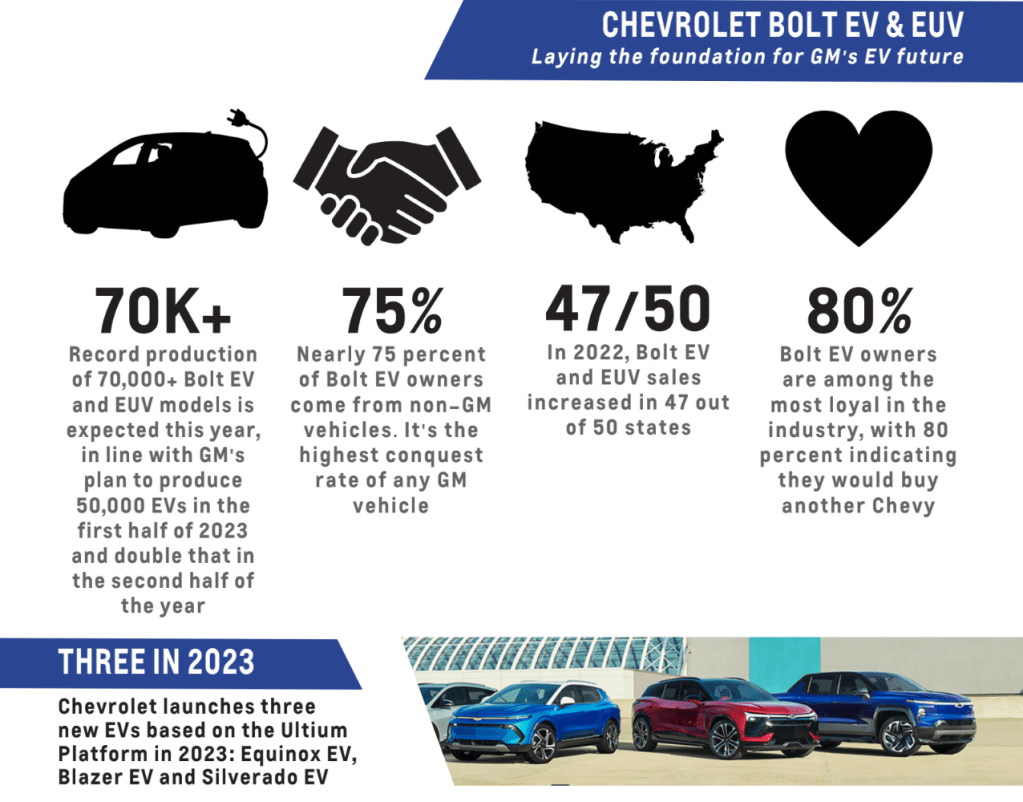GM – along with its earnings announcement this morning – also announced the end of the Chevy Bolt EV and EUV with the last cars rolling off the Orion assembly line late this year. This marks the end of the Bolt EV as the most affordable/capable EV in the US market and a pioneering electrification milestone.
The news was expected as the Chevy Equinox and its ~$30,000 starting price is expected in the Fall, largely taking the place of the small footprint CUV segment. The Equinox and Blazer SS, due this summer, are based on GM’s Ultium platform and this will phase out the Bolt’s older system.
A Chevy Spokesperson said:
When the Chevrolet Bolt EV launched, it was a huge technical achievement and the first affordable EV, which set in motion GM’s all-electric future. As the company continues to grow it’s EV portfolio with the Ultium platform, and as construction continues at the Orion Township, MI, assembly plant in preparation for battery electric truck production beginning in 2024, Chevrolet confirmed Bolt EV and EUV production will end late this year. Chevrolet will launch several new EVs later this year based on the Ultium platform in key segments, including the Silverado EV, Blazer EV and Equinox EV.
The Bolt was the best US selling non-Tesla EV in the first quarter with almost 20,000 sold. Chevy dealers are seeing very long lines for the vehicle, sometimes reaching until the end of the year when GM will cease production.

GM said that 75% of Bolt owners were new to GM, the highest conquest rate for any of its vehicles. At the same time, Bolt owners are among the happiest with80% saying they would buy another Chevy.
The Bolt is coming off its best selling year and quarter ever with GM unable to fill demand.
Record production of 70,000+ Bolt EV and EUV models is expected this year, in line with GM’s plan to produce 50,000 EVs in the first half of 2023 and double that in the second half of the year
Electrek’s Take
We all knew this was coming – and with the Equinox sitting right across from the Bolt at trade shows looking remarkably similar in size – we pretty much knew the when as well.
But this is a big moment nonetheless. The Chevy Bolt in 2017 beat Tesla’s Model 3 to be the first long range, low cost electric vehicle in production. GM, of course, screwed the pooch in not making many of them and then of course messing up the battery fire messaging, making the Bolt the “Pinto” of EV battery fire issues.
The Bolt also suffered from some Engineering mis-steps. In 2017 when it was introduced, its 54kW charging speed was reasonable (and actually faster than most of the 50kW chargers out there and just a bit slower than Tesla’s charging speeds). But 7 years later and GM didn’t upgrade the charging speed at all, making the Bolt more of an around town kind of vehicle only good for very occasional long trips.
But the Bolt is an incredible car and is very safe in its current iterations. At a starting price of $25,600, before incentives, it is also the most affordable, fully capable EV and was named Electrek’s EV of the Year last year. I own a Bolt and 2 Teslas and my wife and I fight over who gets to take the Bolt every morning.
If I’m waiting for a Chevy Bolt or a Chevy Bolt owner (I am), do I panic? No. The current batteries are warranted for at least eight years and will likely last many, many more. Heck, it has CarPlay and Android Auto, which GM’s next gen cars aren’t guaranteed to have.
FTC: We use income earning auto affiliate links. More.








